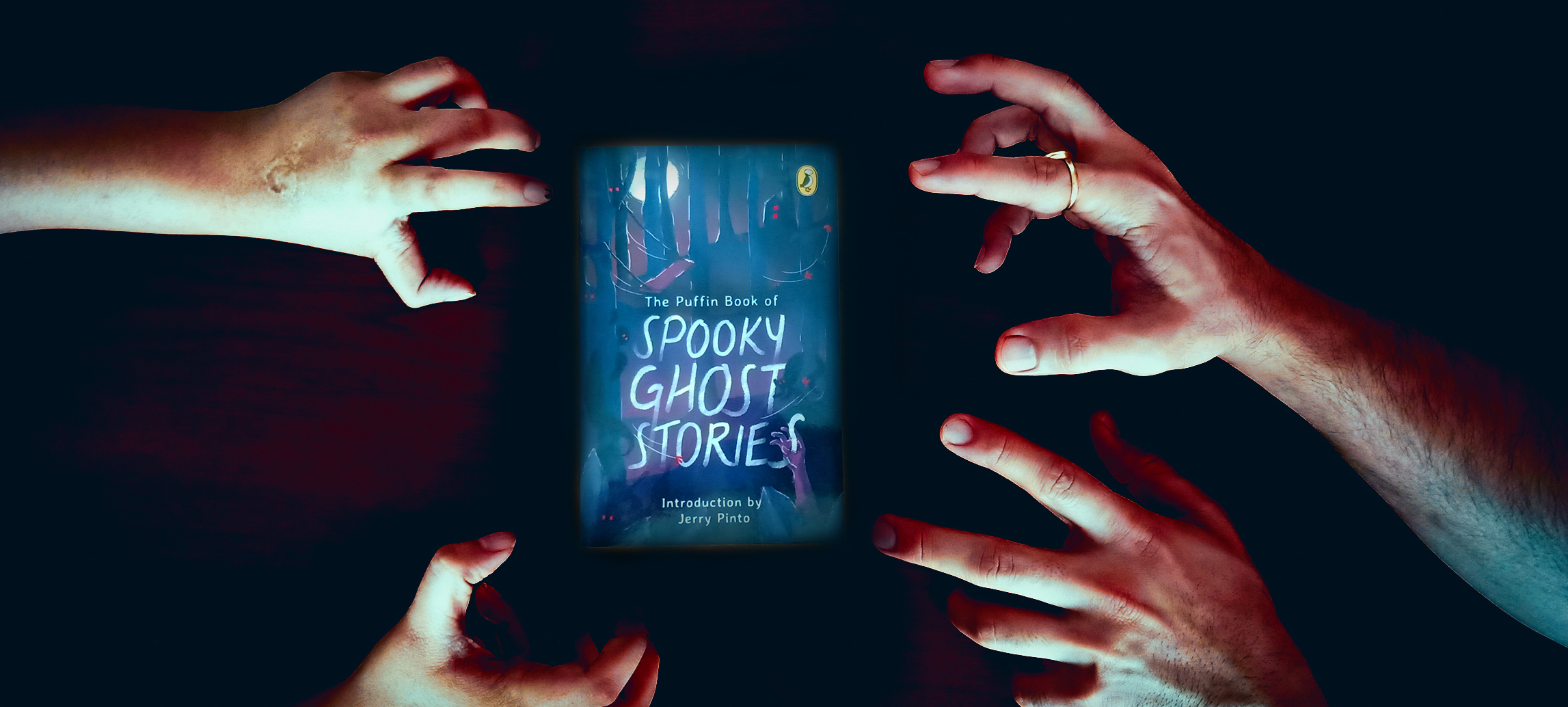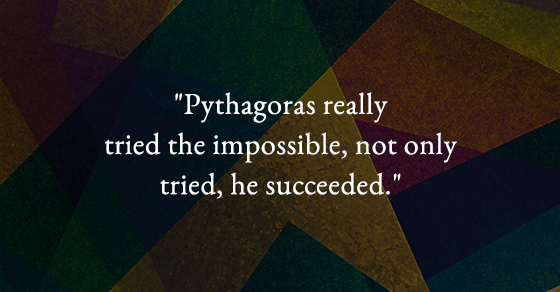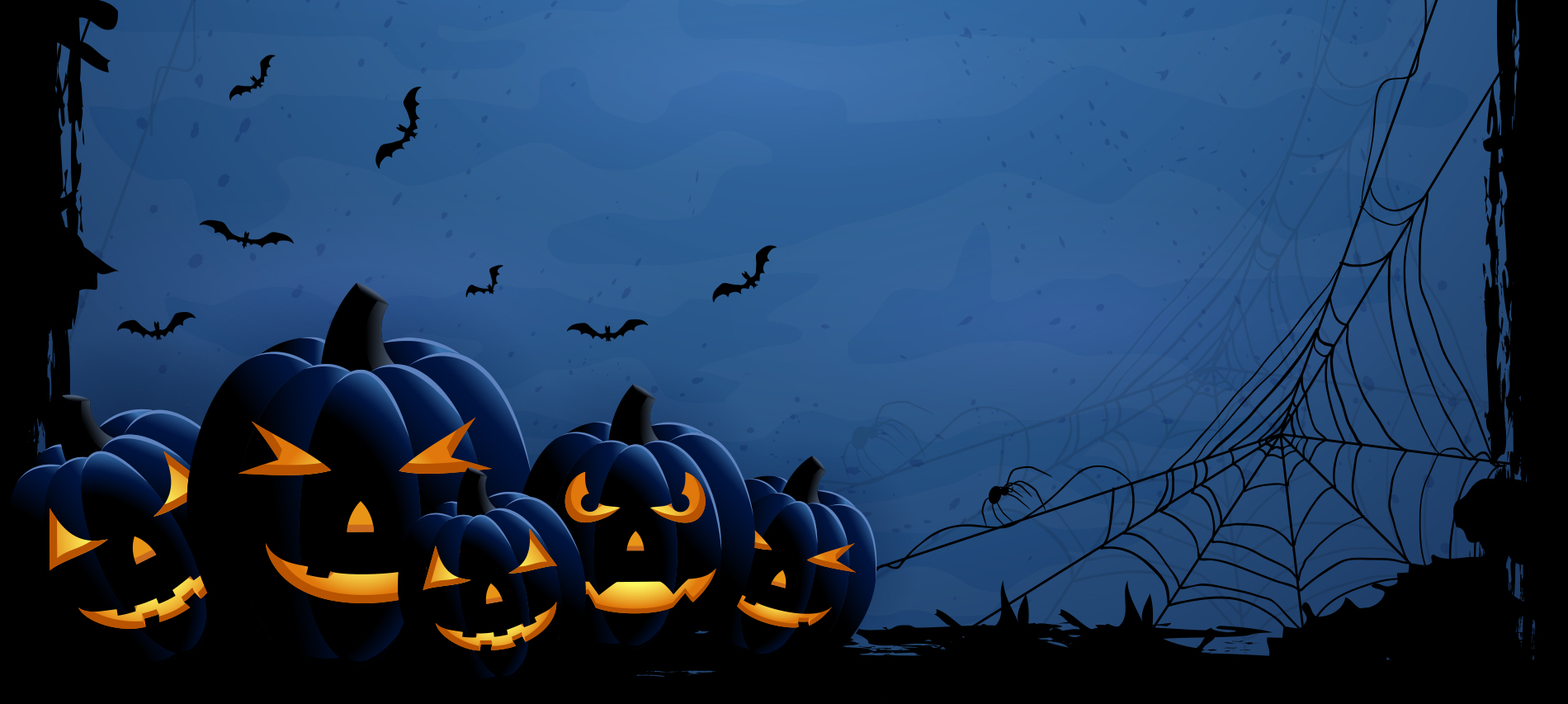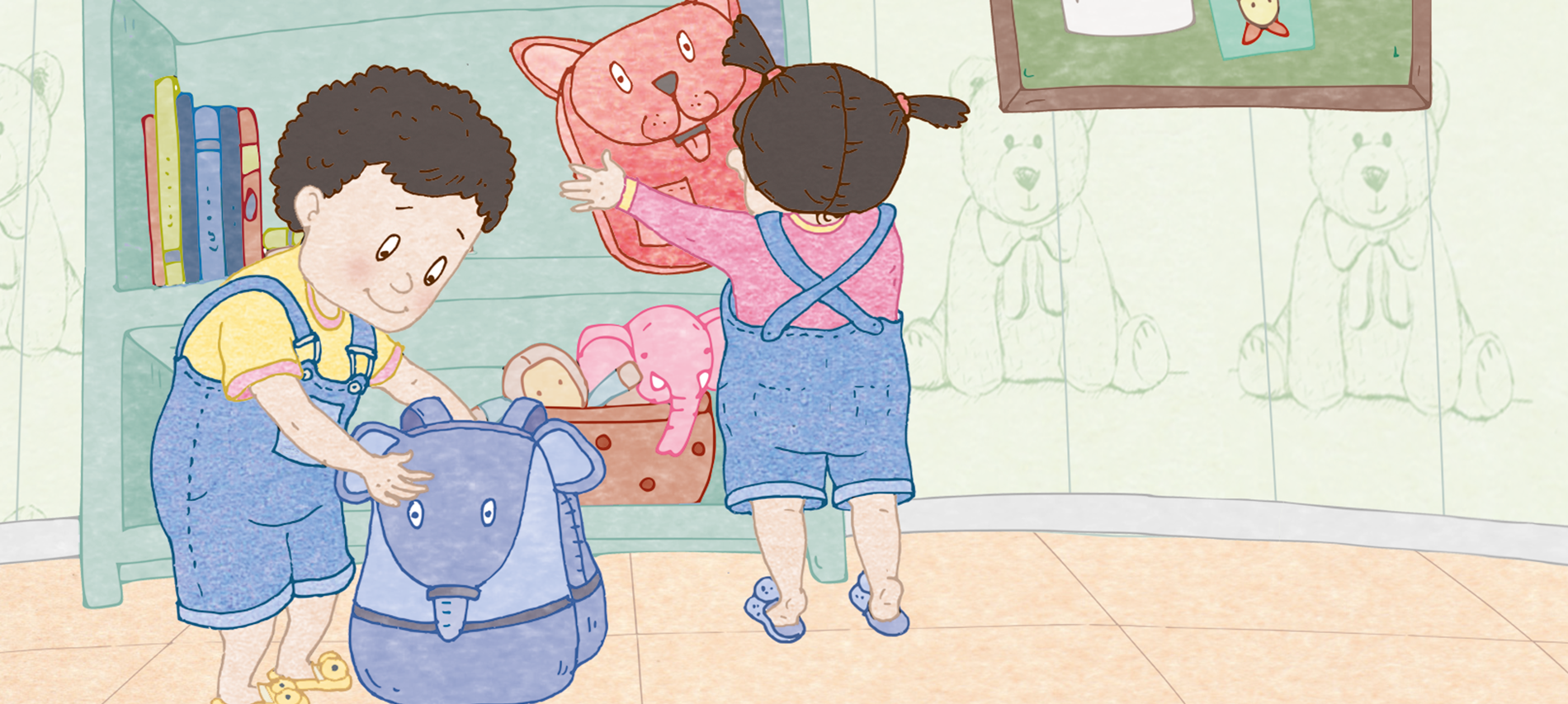Celebrated author Usha Narayanan’s new book, Prem Purana, is a chronicle of love, longing, and the unexpected trials and tribulations one takes on in the journey of love. The book explores how even the mightiest of Gods and Goddesses have not remained untouched by love — with Ganesha taking on the challenge to please his wives, Ravana sharing an unbreakable bond with Mandodari, and Nala and Damayanti’s love withstanding the test of time.
Here are a few times the Gods surprised us with their deeds in love.
Myriad of stories

Fable of the mouse

The wonders of charming Gajamukha

Lord Ganesha’s vast appetite

Bad angel vs good angel

The game of Chaturanga

The story behind the fall

Hamsa, the cupid

Aren’t these facts fascinating?

Tag: Penguin Random House
Story of a He-Ghoul, An Excerpt from ‘Boo’
‘Boo’ by Shinie Antony is a well-crafted collection of horror stories written by some of the renowned names of the literary circuit.
This Halloween, here’s an excerpt from ‘He-Ghoul’ a spooky story by K.R. Meera, to send a chill down your spine.
She put on the lingerie she had chosen, many years ago, for that last rendezvous. The steps leading down to the cellar were next to the staircase, which climbed up from the drawing room with its tall marble pillars and arches, wound in a semicircle around the entire dining room and ended near the kitchen. After dinner, when she stood gazing at the antelope heads on the drawing room walls, the caretaker’s wife came up to her to mark her forehead with kumkum from the Mariamman temple and tie a piece of blessed string around her wrist. That made her flinch. Her lover had also anointed her forehead with kumkum before their first lovemaking. Once the caretaker and his wife went out to the watcher’s shed, she was all alone. She untied the string from her wrist, wiped off the kumkum. Then she strained to imagine into presence her lover’s lost soul. Sex and fear were the same to her. She could not feel either until they were roused to fullness in and through her imagination.
But the ghoul revealed himself only after she had fallen asleep. A dog howled and woke her up. A thousand dogs howled after that, one by one. It was pitch-dark all around. A scream flew up from below the stairs. Then, a scary silence crept everywhere. She got up and opened the door to the balcony. The French windows stood completely open, and also the door to the corridor. Someone was running, panting.
Then, at the very end of the corridor, he appeared. She started, and snapped, ‘Who’s that?’
He vanished. She went back into her room and shut the door, suspecting a thief, and picked up her mobile phone, scanning it for signs of a signal. Her mind focused on what to do if the thief broke in; her heart thundered. It had pounded thus only at their last rendezvous, she remembered. Don’t thunder like this at the presence of a mere thief, she scolded her heart. The wind blew harshly. As if infuriated by her indifference, it pulled down the objects on her table, pulled free her tied-up tresses, tugged up her nightdress, and made her gasp for breath as it forced dust into her eyes and nose. Instantly, she realized that it was her lover-turned-ghoul that she had run into. Opening the door, she stepped into the balcony and, from there, turned into the corridor. Suddenly, the lights blacked out. Darkness invaded every corner. She kept moving forward. She imagined her lover-ghoul sucking her lifeblood, killing her. That would be such a romantic way to die. She too would embrace death in the very same bungalow where he was killed. Her blood would spread over the scars of his dried-up blood on the floor. Maybe no one will believe this; maybe he didn’t deserve it at all—but what a tale of love, so intense!
That house of glass windows and crystal cupboards was built way back, when kings still ruled. Just a few months ago, the relative of a friend had bought it for a song. The rooms were filled with the musty odour of termites. She had noticed a large candle and a matchbox on the dining table at dinner. So she went towards the dining table in the dark, found the matchbox, and lit a matchstick. For the first time in her life, she saw a He-Ghoul. A man of glass, a hollow man. Of no flesh, no marrow, no hair on its head, no fangs, no blood dripping tongue. A body fissured and fragmented. A neck that looked as if it would snap at any moment. Whitish and motionless eyeballs deep in their sockets. Anyone else would have screamed in fright seeing him. She felt no fear. What was terrifying was the sheer hardness of the He-Ghoul’s face, it’s very hollowness and its naked inferiority, impossible to hide even after death. Even when he’s a ghoul, a man is a man; he shows off more than what he’s got.
He was playing He-Man before her now, stretching his body tall, beyond the bungalow’s upper storey. He raised his brittle arms of glass above the darkened ceiling. As vain as ever, he held his crumbling neck erect. ‘Admit it! I am the stronger one even now!’—that was a silent plea, but it resounded everywhere. In a final gesture of frustration, he pulled off a ceiling fan and flung it down. It nearly hit her, but he knocked it aside and went all billowy, as though he had done her a great favour. For this favour, should you not forget the crimes I committed when I was alive? he asked her soundlessly. Should you not be grateful? That amused her. She had loved him so when he was alive; she had been ready to die for him, deluded that he deserved the highest sacrifice. Now she imagined courting death for this lover long dead. What a poetic death that would be. Embracing the end in the very same cellar in which he died just before he was to step onto a high pedestal in politics! She would seize him from the blazing depths of hell. Even if that were impossible, even if that would make her scorn herself, what a love story it would be, one that could mesmerize the masses!

8 facts on Perumal Murugan You Didn’t Know About
A Neighing Man And His Son: ‘The Puffin Book of Spooky Ghost Stories’ — An Excerpt
Get ready for 13 ghostly, ghastly tales for bravehearts. Be prepared for eerie hauntings, dreadful happenings and creatures that go bump in the night. In this spine-chilling collection you will encounter a creepy spirit that occupies a deserted bungalow, the reincarnation of a goddess who wants the sacrifice of blood, an ominous swing that makes one fly far away into a dark, deathly world, and the sheer wrath of the dead. Read about a haunted school, a spooky wind-chime, a possessed doll and other supernatural elements that will take you on a nightmarish expedition into fear. Written by the best contemporary authors including Ruskin Bond, Jerry Pinto, Paro Anand, Subhadra Sen Gupta, among others.
Here’s a small excerpt from‘The Puffin Book of Spooky Ghost Stories’ for your child that is sure to fascinate them and make them want to read more!
Like Father Like Son — Paro Anand
Mr Anderson had stayed with us for three months. I’d got on very well with him. I think that was because both of us were slightly offbeat. He actually discussed stuff with me the way no other adult did. Although he worked in the Norwegian company where my dad worked too, Mr Anderson was also interested in the supernatural and other weird stuff. Not like most company executives who can be so stuffy.
In fact, that’s why he had come to India. He wanted to study Tantra and the exotic, mystical things that India is famous for. He also got very involved in yoga. There was an ashram in Bangalore that he visited once. He came back so excited about it that he put in an application for a year’s leave, and then called his wife and son in Oslo to ask them to join him.
He said he would take about a fortnight to settle down at the ashram and make arrangements for them to join him. ‘It’s wonderful there, Bhavani,’ he said to me one day. ‘You would love it. So peaceful. So spiritual. Like heaven on earth. If I were to die there, I would die a happy man.’
‘Oh, don’t say things like that,’ I protested.
‘Don’t you worry,’ he assured me. ‘Even if I go to the next world, be sure that I will contact you somehow or the other to tell you all about it!’ And he laughed that peculiar laugh of his. Almost as if he was neighing.
‘I must have been a horse in my last avatar,’ he joked to me once. He loved horses passionately. And then he would pull the right lobe of his ear, which was another one of his peculiar mannerisms.
Soon Mr Anderson left for the ashram, having bid us goodbye, promising to be in touch. But he never did; he just disappeared. Literally vanished off the face of this earth. Or so it seemed.
His wife called from Oslo about two and half weeks later to find out why he hadn’t called. We didn’t know, presuming all this while that he was safely at the ashram, settling in. But inquiries revealed that he had never shown up. The police department was duly informed, and a couple of months passed without anything significant being found. Dad’s company hired a private detective from an agency, but all they came up with was what we already knew: he had never reached the ashram. Somewhere between boarding the train and arriving in Bangalore, he had mysteriously disappeared.
Following this, Mrs Anderson called to say that she and her son were planning to come to India to try and carry out some search themselves. Naturally, they were wild with worry. And who could blame them? Dad and Ma asked them to come and stay with us.
So now I stood at the window of my newly clean room, awaiting Mrs Anderson and her son. I must admit that I had mixed feelings about this. On the one hand, I felt that it was quite an invasion of my privacy to have some strange boy in my room. I had to move to a couch in my parents’ room, while Mrs Anderson would sleep in the guest room. On the other hand, the idea of a possible mystery-laden adventure was thrilling. And on the third hand, if there is such a thing as a third hand, the idea of a thirteen-year-old Norwegian boy was exciting. With a little bit of luck, he might turn out to be, you know, something out of Baywatch. I knew that his name was Jan, pronounced Yarn, but I didn’t know much else. Somehow, Mr Anderson had been closed about his son, dismissing him with a ‘Oh! He has his problems’ type of remark.
The car drove up at last, and I went out to meet our guests. Mrs Anderson came out first; it was obvious that she was trying to be brave. Then I glanced inside the car to get my first look at Jan. My father was leaning in and supporting someone who seemed to be having trouble getting out.
Oh, he was blond and blue-eyed alright, but in such a faded sort of way that it was like some cloth that has been left out in the sun too long. Yeah, cloth-like was what he was. Limp, lightening-white skin, pain washed eyes and an almost boneless, muscleless body. Baywatch type he certainly was not. My heart sank as Dad put a supporting arm around him and brought him slowly out.
‘Jan, this is our daughter, Bhavani,’ Dad introduced me. Awkwardly, I held my hand out which only served to make things worse, for Jan’s arms continued to hang uselessly by his side.
‘Hello,’ he said, ‘I’m sorry, I cannot…’
‘Oh!’
Later, while helping Ma get the tea, I hissed, ‘What’s wrong with him?’ almost as if it were her fault.
‘He had an accident as a young boy,’ answered Ma, and went on to lecture me about how I should be good to him. ‘Be kind to dumb animals…’ I muttered meanly. His mother helped him eat, although he could manage a bite once he’d been propped up properly in a chair. I felt embarrassed just to look at him, let alone talk to him as Dad said I should, muttering under his breath in Hindi. Then an already embarrassing situation became worse when Mrs Anderson started to cry.
Things gradually did get better. At least the guy could talk. Ma and Mrs Anderson would go out frequently in search of clues which could help them trace Mr Anderson. And since we had our vacation, I stayed home with Jan. He talked quite a bit about his school, friends, music and stuff like that, but actually very little about his father.
Then one day the truth was out: the reason behind why the father and son hardly talked about each other.
It turned out that Jan had been born perfectly normal, the pride and joy of his parents. His father had always loved to ride, and wanted his son to be a champion horseman. But to his disappointment, his one and only son had no talent with horses. Let alone talent, he was actually terrified of them. The father couldn’t accept this. He continued to force him. Hard. Way too hard, against the boy’s wishes. Until . . . one day the boy fell from his horse while taking a jump. The accident left him damaged, half human, half vegetable.
The guilt and remorse on the one hand, and the resentment and frustration on the other, led to the father-son relationship being fragmented. Jan said that they hardly talked to each other, and I knew that they hardly talked about each other. ‘But when he disappeared,’ said Jan quietly, tired with the effort of having relived those painful moments, ‘I suddenly realized that both of us were being stupid. What was done was done. We should try to rebuild our relationship, forget the past. But now. . . now I don’t know if we’ll ever have the chance….’ Pain, regret and loss swam in his pale eyes as they filled with tears. But he didn’t let them fall.
‘I’m sorry… ’ said Jan.
‘Yeah, I’m sorry too,’ I said.
And then he did it. He pulled the lobe of his right ear, just as his father always did. I didn’t make a big deal out of it. At least not right away. After all, lots of kids pick up odd habits from their parents. It took me a moment to remember. Remember that he couldn’t lift his arms. He hadn’t been able to shake my hand when he arrived. Yet, his right hand had tugged casually at his ear, just as his father used to do. I looked carefully at him, but he didn’t seem to find anything strange in what he had done.
That night the weirdest thing happened. I dreamt of Mr Anderson. He didn’t actually say anything to me, but smiled and waved, as if saying goodbye. And then, as I watched, he looked at me and pulled the lobe of his right ear, and threw back his head and laughed his horsy laugh. And then he turned into a horse and galloped past me! I tried to grab hold of his mane, shouting, ‘Wait…wait! You don’t understand…!’
I woke up in a sweat, not able to make much sense of it. Next morning, I laughed at myself for worrying over such a ridiculous thing, and put it out of y mind.
When Jan and I were alone, he suddenly said, ‘I dreamt of my father last night.’ I had my back to him and fairly leapt around to face him. And I found him doing that wretched ear lobe thing again. ‘Did he turn into a horse?’ I blurted out.
‘Pardon?’ he said, looking shocked and hurt, and I felt stupid. ‘Er…nothing…’ I mumbled.
‘A horse? Did who turn into a horse?’ he persisted.
‘I’m sorry, I don’t know what I was thinking…’ was the best I could manage. He gave me a strange look after this, and his hand went up to his ear. I held my breath, but he didn’t pull the lobe.
Naturally, with him so much on my mind, Mr Anderson appeared in my dream again. This time he spoke to me and said the strangest thing, ‘I told you that I’d come back. That I’d contact you somehow, didn’t I?’
‘Are you dead?’ I asked, but he laughed, or rather neighed and galloped past me as a horse again. I ran after him, trying to catch hold of the horse’s flying tail. But he was gone.
Spooky, isn’t it? We’re sure you and your child want to find out more about what happens to the disappeared Mr Anderson and his distraught son. So hurry up and grab a copy of the book now!
The Puffin Book of Spooky Ghost Stories will have horror-story addicts craving for more. Deliciously horrifying, these sinister stories will unnerve the mind and chill the heart.
Read an Excerpt from John Green’s book ‘Turtles All the Way Down’.
John Green is no stranger to us. The author has never ceased to awe and amaze the hearts of young readers and fiction lovers. From ‘Looking for Alaska’ to his recent novel, ‘The Fault in Our Stars’ the readers are kept on a loop, asking for more from Green. His new book ‘Turtles All the Way Down’ explores the story of Aza and her friends.
Who is Aza Holmes and what is her story?
Here’s an excerpt from his new book.
I WAS WATCHING VIDEOS ON MY PHONE the next morning when the call came in. “Hello?” I said.
“Aza Holmes?”
“This is she.”
“This is Simon Morris. I believe you’re acquainted with Davis Pickett.”
Hold on.” I slipped on some shoes, snuck past Mom, who was watching TV in the living room while grading tests, and went outside. I walked down to the edge of our yard and sat down facing the house.
“Okay, hi,” I said.
“I understand that you’ve received a gift from Davis.”
“Yeah,” I said. “I split it with my friend; is that okay?”
“How you handle your financial affairs is unimportant to me. Ms. Holmes, you may find that if a teenager walks into a bank with a vast array of hundred-dollar bills, the bank will generally be suspicious, so I’ve spoken to one of our bankers at Second Indianapolis, and they’ll accept your deposit. I’ve set an appointment for you at three fifteen p.m. on Monday at the branch at Eighty-Sixth Street and College Avenue. I believe your school day ends at two fifty- five, so you should have adequate time to get there.”
“How do you know—”
“I’m thorough.”
“Can I ask you a question?”
“You just have,” he noted dryly.
“So you’re taking care of Pickett’s affairs while he is gone?”
“That’s correct.”
“And if Pickett shows up somewhere . . .”
“Then the pleasures and sorrows of his life will belong to him again. Until then, some of them fall to me. May I request that you come to your point?”
“I’m sorta worried about Noah.”
“Worried?”
“He just seems really sad, and there’s kind of no one there to look after him. I mean, isn’t there any other family?”
“None with whom the Picketts have a good relationship. Davis has been declared an emancipated minor by the state and is his brother’s legal guardian.”
“I don’t mean a legal guardian. I mean someone who actually, you know, looks after him. Like, Davis isn’t a parent. I mean, they’re not just gonna be alone forever, are they? What if their dad is dead or something?”
“Ms. Holmes, legal death is different from biological death. I trust that Russell is both legally and biologically living, but I know he is legally alive because Indiana law considers an individual alive until either biological evidence of their death emerges or seven years pass from the last evidence of life. So, the legal question—”
“I don’t mean legally,” I said. “I just mean, who’s going to take care of him?”
“But I can only answer that question legally. And the legal answer is that I administer the nancial affairs, the house manager administers the home affairs, and Davis is the guardian. Your concern is admirable, Ms. Holmes, but I assure you that everything is cared for, legally. Three fifteen tomorrow. Your banker’s name is Josephine Jackson. Do you have any other questions of pertinence to your situation?”
“I don’t think so.”
“Well, you have my number. Be well, Ms. Holmes.”
Prepare yourself for another of Green’s masterpiece!

Why Osho was inspired by Pythagoras?
Pythagoras, as we know, was not just a mathematician – he had the power to explore the workings of the inner mind and the outer world. The wisdom of Pythagoras influenced Osho to embark on matters of politics, love and meditation, obedience and surrender.
Pythagoras, the spiritual and divine master stirs an effect in Osho’s ‘Philosophia Perennis’. Osho, in this volume, speaks of the little-known teachings of Pythagoras.
Here’s an excerpt from the book.
The truth of Pythagoras, the truth of the greatest synthesis ever attempted, can trigger a process in you, can start something so immense, about which you could have never have dreamed. That is the whole purpose of satsang: being in communion with a master. His presence, his utterances, his silences start working on you—sometimes even in spite of you. Sometimes you become aware of those processes, sometimes you are not aware of them; they start working underneath your consciousness. One day, they explode into a great blossoming.
Pythagoras really tried the impossible, not only tried, he succeeded. But the world wants to live in division, because the world can only understand conflict. It cannot understand synthesis. Synthesis can only be understood when some synthesis inside you starts happening; otherwise synthesis is non-understandable, will be misunderstood.
Everybody was against Pythagoras. All religions, all sects, all the so-called gurus of those days were against Pythagoras. In fact, they should have been there for him because he was bringing together all the scattered fragments of truth. But it hurts . . .
If I say that the Koran is true, as true as the Vedas, and people understand this, then both Mohammedans and Hindus would be tremendously happy. But that doesn’t happen; both become angry. The Mohammedan becomes angry because I have compared his holy book to an ordinary book, the Vedas; the Hindu becomes angry because I have compared his holy book to an ordinary book, the Koran. They both become angry because their egos are hurt.
You can understand what must have happened to Pythagoras because it is happening to me, it is happening to you, the same process. Hindus are against it, Mohammedans are against it; Jains, Buddhists, and Christians are against it. Why?
I am bringing Christ, Buddha, Mahavir, Zarathustra, Lao Tzu and Krishna to the highest possible synthesis, but still they are all against it. The reason is: they are divided within themselves. They can only understand that which they are. You can never understand anything beyond your consciousness. If you are split, you can only understand a split world. If you are in a subtle harmony inside, only then will any harmony happening outside be understood.
It is good that you felt great gratitude arising in you listening to the synthesis. It shows that something has started becoming integrated in you—something that is bringing you together, that is creating a kind of unity between the two hemispheres of your brain, the left and the right.
These two hemispheres of the brain have to be understood, and very deeply, because much depends on that. Now scientists are also in deep agreement with the ancient mystic lore that unless these two brains are bridged and bridged rightly a man remains schizophrenic. They are bridged, but in a very, very small way; just a small thread bridges them. That thread can be cut.

Gift Your Child These Deliciously Spooky Tales This Halloween
Halloween is just around the corner and the chill in the air has begun to set in! As we pull out our pumpkin delicacies and prepare to make merry in the creepiest of costumes, here are a few amazingly spooky books for your child to feast on this Halloween!
Trick or treat? You tell us!
Secrets by Ruskin Bond

Set in the 1940s, all is not what it looks like in the sleepy little town of Dehradun. The quaint place has its set of dark secrets — from plucky old women to mysterious murderers, Ruskin Bond’s Secrets brings to life the delectably dark tales of a small town set in the black and white days.
Amelia Fang and the Barbaric Ball by Laura Ellen Anderson
 Have you met the inhabitants of Nocturnia yet? Nocturnia — a place where sparkles, colours and unicorns are things to be afraid of. Oh, and it’s also home to the little Amelia Fang and her pet pumpkin Squashy, who are in for some trouble as they race against time and discover that Nocturnia is much darker than they thought it is!
Have you met the inhabitants of Nocturnia yet? Nocturnia — a place where sparkles, colours and unicorns are things to be afraid of. Oh, and it’s also home to the little Amelia Fang and her pet pumpkin Squashy, who are in for some trouble as they race against time and discover that Nocturnia is much darker than they thought it is!
The Puffin Book of Spooky Ghost Stories
 An ominous collection of 13 spooky stories where you meet spirits in deserted bungalows, death traps on swings that take you a little too far away, a reincarnated goddess with an insatiable bloodthirst and a whole lot others from beyond the grave and the unknown!
An ominous collection of 13 spooky stories where you meet spirits in deserted bungalows, death traps on swings that take you a little too far away, a reincarnated goddess with an insatiable bloodthirst and a whole lot others from beyond the grave and the unknown!
The Witches by Roald Dahl

The Grand High Witch is out to get you! She loathes children and schemes to trick you by dressing up as an ordinary woman, while being an extraordinarily evil witch all along! Only a little boy and his grandmother can stop The Grand High Witch from coming for you. Will they succeed?
This Halloween, tell us which story you read to your child in the dead of the night and celebrated the autumn nip with a chill down your spine. Happy Halloween!
Oh No! There’s Just One Tub of Popcorn for Nicky and Noni!: ‘Sharing is Cool’ — An Excerpt
Sonia Mehta’s super cool twins, Nicky and Noni, are in some trouble again! This time over sharing a tub of popcorn.
From her newest series — My Book of Values, Sonia Mehta explores how totally cool it is to instill and nurture some important values in children from an early age. While value education classes might be preachy, boring even, Sonia Mehta’s books make it fun for one and all, especially for your little one.
In Sharing is Cool, Sonia Mehta lets Nicky and Noni show us why indeed it is cool to share. How? Let’s find out!




That fight over the popcorn seems far from over! Do you think Nicky and Noni make peace finally? Grab a copy for your child today and find out!

9 Amazing Facts On Bilal Siddiqi You Should Know
Bilal Siddiqi, a shining star among the young authors has authored three novels till date and is embarking on his fourth.
Siddiqi is a fan of the world of espionage and thriller. Currently, Siddiqi is working as a screenwriter for Red Chillies Entertainment headed by Shahrukh Khan and Gauri Khan.
His new novel The Stardust Affair will transport you into an adrenaline-filled world of danger and deceit.
Here are some facts about the intrepid author.
His first novel was called The Bard of Blood

Personal interest evoked his instincts to pick up the pen

Woah!

Aww!

B-town’s creative child

Siddiqi, the magician with a pen

We hope to see the magic on the big screen soon

Like master, like protege

How many of these facts did you know about?

Excerpt from 'Bharat: The Man Who Built a Nation'
Dr Vineet Agarwal brilliantly retells the story of the son of Dushyant and Shakuntala, the grandson of Brahmarishi Vishwamitra in his latest book, Bharat: The Man Who Built a Nation.
Here’s an excerpt from the book.
Voices filled the royal hall of Hastinapur, bouncing off the two dozen marble pillars that supported the high vaulted ceiling. Wide latticed windows provided illumination as well as ventilation to the cavernous hall that was full of people watching the royal debate.
Aileen, ruler of the Puru kingdom, sat on a beautifully carved sandalwood throne that had been fashioned to resemble the vehicle of the moon god, the founding father of the Chandravansh. It was shaped like a chariot drawn by eight antelopes, and the king occupied the central seat, sheltered by a silver umbrella. The elderly king was presiding over a debate between his eldest son and the royal council. Of his five sons, Dushyant, the eldest, was quite simply the best.
Since the day he had first stepped into the court, the crown prince had shown a flair for solving the tricky situations that arose in the running of a kingdom. Dushyant was almost twenty-five now, and towered over his sire. Aileen saw a glimpse of his own younger self in him; they had the same tan complexion, sharp nose and dark eyes but the king had a greying beard and his face had assimilated fine lines from years of looking after the kingdom, while his son’s visage had the freshness of youth. Rigorous training had made Dushyant’s body lithe like that of a cheetah and his mind as sharp as a needle. He was practical and perceptive, and even now seemed to be winning the debate that had almost reached its conclusion.
For more than a prehar now, the councillors and the prince had been debating the need to change old policies followed by the kingdom—three hours and counting. Aileen had been trying to get his council to formulate new guidelines for more inclusive development, but to no avail. Change was not easy for anyone, let alone senior members of the court who were set in their ways and accustomed to their lavish lifestyles, but the king hoped that his son would be able to convince them.
Rising to his full six feet, Dushyant addressed the assembly emphatically, ‘The time has come for Hastinapur to introspect. We must decide which of our traditions are redundant and which can be retained. As the wielder of Shiva’s axe, Parshu Raam showed us, there is no place for practices that encourage corruption in this new world order.’
Aileen watched the seasoned councillors wince, a tiny smile playing on his lips. The use of Parshu-Raam’s name was a clever touch. Over the past year, the son of Rishi Yamdagni had gone on a rampage, annihilating autocratic rulers from the Himalayas to the southern ocean, paving the way for a new and just class of kings. Brahmins, Vaishyas and Shudras were the new Kshatriyas of Nabhi-varsh and what remained of the old guard was still haunted by the prospect of Parshu Raam’s return. Aileen himself had been lucky to escape with his life. His superior, Kartavirya Arjun, the emperor of the world, had not been so fortunate.
Dushyant’s closing argument had made even the most reluctant of councillors agree to the demand for modernization and as they passed a unanimous motion in favour of the idea, Aileen dismissed the court for the day and called his son to the throne.
‘My son,’ he said in a tone that betrayed his satisfaction, ‘seeing the way you have convinced the senior councillors to change their stance for the benefit of the people, I am confident that you are quite ready to look after the affairs of this kingdom. Acharya Dirghatamas, other senior members of the family and I concur that the time has come to pass on the crown of Puruvansh.’























